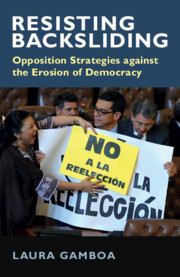Book contents
- Resisting Backsliding
- Resisting Backsliding
- Copyright page
- Dedication
- Contents
- Figures
- Tables
- Acknowledgments
- 1 Introduction
- 2 Opposition Strategies against the Erosion of Democracy
- 3 Electing Leaders with Hegemonic Aspirations
- 4 “Chávez Vete Ya”: The Erosion of Democracy in Venezuela
- 5 Preventing the Erosion of Democracy in Colombia
- 6 Opposition Strategies Elsewhere
- 7 Conclusion
- Book part
- References
- Index
2 - Opposition Strategies against the Erosion of Democracy
Published online by Cambridge University Press: 10 November 2022
- Resisting Backsliding
- Resisting Backsliding
- Copyright page
- Dedication
- Contents
- Figures
- Tables
- Acknowledgments
- 1 Introduction
- 2 Opposition Strategies against the Erosion of Democracy
- 3 Electing Leaders with Hegemonic Aspirations
- 4 “Chávez Vete Ya”: The Erosion of Democracy in Venezuela
- 5 Preventing the Erosion of Democracy in Colombia
- 6 Opposition Strategies Elsewhere
- 7 Conclusion
- Book part
- References
- Index
Summary
In this chapter, I develop a theory that focuses on the opposition’s strategic choices to fight the erosion of democracy. I define democratic erosion as a type of regime transition that happens over time, giving the opposition ample opportunity to respond, even after a leader willing to circumvent democracy has attained power. The strategies the opposition chooses and the goals it uses them for, I argue, are critical to understanding why some executives with hegemonic aspirations successfully erode democracy and others do not.
Keywords
- Type
- Chapter
- Information
- Resisting BackslidingOpposition Strategies against the Erosion of Democracy, pp. 22 - 49Publisher: Cambridge University PressPrint publication year: 2022

